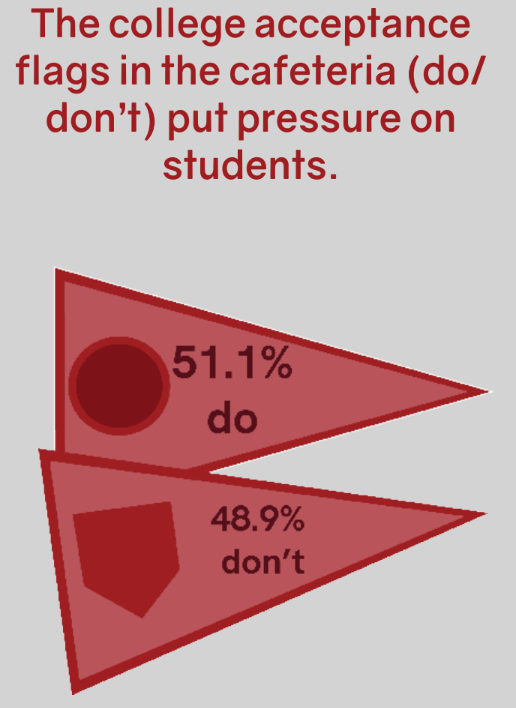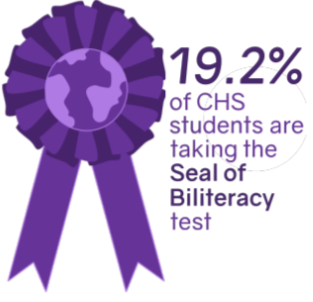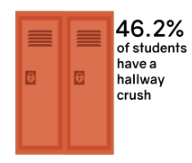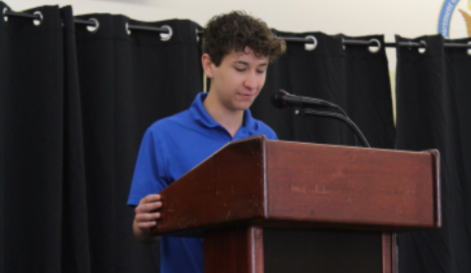CHS college acceptance tradition raises red flags: Do public acceptance announcements put pressure on students?
BLOT GRAPHIC BY SABRINA Z. LIDING
A survey of 45 CHS students from April 26 to May 2.
May 20, 2022
Though many CHS students look forward to displaying their college acceptances for the school to see, not all feel positively about the flags in the cafeteria. Some feel it negatively impacts their college acceptance process and adds stress to this time.
Senior John Garby of Middletown feels that the flags did not make his application process more stressful, but he has caught sight of the pressure surrounding them.
“I feel like there’s a lot of pressure for me to tell my guidance counselor I got into this college or to this college. It’s kind of like a competition,” Garby said. “There’s a bunch of other people like, ‘Oh, they got into this college and I need to get my acceptances up there.’”
According to nj.com, the average SAT score in New Jersey’s Class of 2020 was 1072 out of 1600, while CHS students had an average score of 1330. English teacher Kelly Lang explains that the culture around college acceptances begins with standardized test scores, long before the application process.
“I think it starts out with SAT scores, and the minute SAT scores come out everybody wants to know ‘What did you get? What did you get?’” Lang said. “I think it’s a competition that can make people feel badly if they don’t feel that their score is sufficient enough, and I think it’s the same thing with college acceptances.”
With high scores come high expectations for many students, according to guidance counselor Melanie Sambataro.
“I do think that people feel a certain way about particular colleges and are prouder of some than they are of others,” Sambataro said. “I wish that it wasn’t that way because I think it’s really more about finding out what works best for you and not about the name.”
According to Naviance, 23 CHS students have started their college educations at Brookdale Community College since 2006. Yearly in-state tuition for Brookdale is $8,804, according to the United States Department of Education. This information comes in stark contrast to a U.S. News & World Report finding that the average cost of a private college tuition at an average of $43,775 for the 2021-2022 academic year.
“It’s also a socioeconomic statement in the sense that if your parents don’t have the money to pay for you to apply to 15 colleges, it’s kind of hurtful if you can only apply to three,” Lang said. “And nobody’s really celebrating the Brookdale acceptance because they do want to see the bigger names, even though maybe going to community college for free and then a state school would make more sense economically.”
An SAT costs at least $55, according to College Board, and an ACT exam costs $60 or more, according to ACT. With the majority of people taking one or both of these tests multiple times, costs can rack up. That does not include test prep. Foley Prep, a private exam prep school with three locations in Monmouth County, charges $5,040 for one of their test prep packages with a private instructor according to their website, foleyprep.com.
Despite the competitive culture that exists around college admissions, senior Gina Dige of Howell thinks fondly of CHS’s college acceptance tradition for the connection it offers students, especially in the close-knit community of CHS.
“I love the college flag tradition,” Dige said. “I think it’s really cool to see where all of the senior class gets accepted to.”
Junior Skyler Glusman of Middletown feels that though it is interesting to see where her peers get in, it is stressful if other students get into colleges that she doesn’t.
“I, as a junior, do not find the college acceptance flags stressful because I use them as inspiration for where I want to apply. As a senior I would definitely think they’re stressful because if everyone else got in and I didn’t get in” Glusman said.
Being they are a long-held tradition at CHS and are well liked by some, Lang suggests another way to keep the tradition alive.
“I think maybe a way to sort of compromise would be maybe to put flags up of colleges that students got into without individual names,” Lang said. “Or to put the flags up of schools that students have committed to. I think that might help.”
















